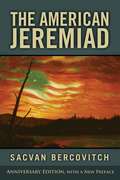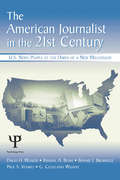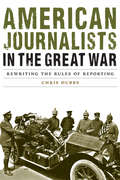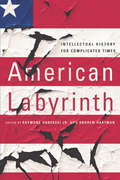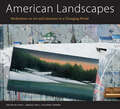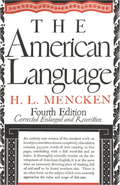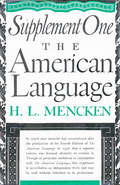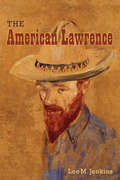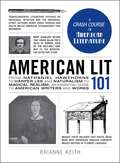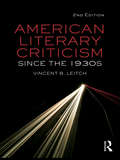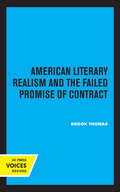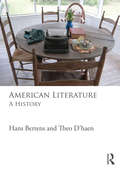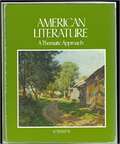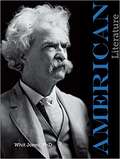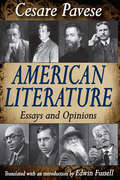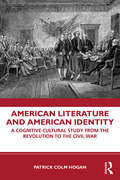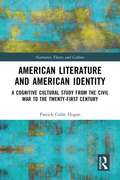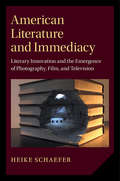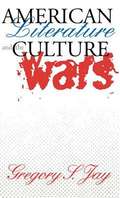- Table View
- List View
The American Jeremiad
by Sacvan BercovitchWhen Sacvan Bercovitch'sThe American Jeremiadfirst appeared in 1978, it was hailed as a landmark study of dissent and cultural formation in America, from the Puritans' writings through the major literary works of the antebellum era. For this long-awaited anniversary edition, Bercovitch has written a deeply thoughtful and challenging new preface that reflects on his classic study of the role of the political sermon, or jeremiad, in America from a contemporary perspective, while assessing developments in the field of American studies and the culture at large.
The American Journalist in the 21st Century: U.S. News People at the Dawn of a New Millennium (Routledge Communication Series)
by David H. Weaver Randal A. Beam Bonnie J. Brownlee Paul S. Voakes G. Cleveland WilhoitAn authoritative and detailed illustration of the state of journalistic practice in the United States today, The American Journalist in the 21st Century sheds light on the demographic and educational backgrounds, working conditions, and professional and ethical values of print, broadcast, and Internet journalists at the beginning of the 21st century. Providing results from telephone surveys of nearly 1,500 U.S. journalists working in a variety of media outlets, this volume updates the findings published in the earlier report, The American Journalist in the 1990s, and reflects the continued evolution of journalistic practice and professionalism. The scope of material included here is extensive and inclusive, representing numerous facets of journalistic practice and professionalism, and featuring separate analyses for women, minority, and online journalists. Many findings are set in context and compared with previous major studies of U.S. journalists conducted in the 1970s, 80s, and 90s. Serving as a detailed snapshot of current journalistic practice, The American Journalist in the 21st Century offers an intriguing and enlightening profile of professional journalists today, and it will be of great interest and value to working journalists, journalism educators, media managers, journalism students, and others seeking insights into the current state of the journalism profession.
American Journalists in the Great War: Rewriting the Rules of Reporting (Studies in War, Society, and the Military)
by Chris DubbsWhen war erupted in Europe in 1914, American journalists hurried across the Atlantic ready to cover it the same way they had covered so many other wars. However, very little about this war was like any other. Its scale, brutality, and duration forced journalists to write their own rules for reporting and keeping the American public informed.American Journalists in the Great War tells the dramatic stories of the journalists who covered World War I for the American public. Chris Dubbs draws on personal accounts from contemporary newspaper and magazine articles and books to convey the experiences of the journalists of World War I, from the western front to the Balkans to the Paris Peace Conference. Their accounts reveal the challenges of finding the war news, transmitting a story, and getting it past the censors. Over the course of the war, reporters found that getting their scoop increasingly meant breaking the rules or redefining the very meaning of war news. Dubbs shares the courageous, harrowing, and sometimes humorous stories of the American reporters who risked their lives in war zones to record their experiences and send the news to the people back home.
American Journals
by Albert Camus Hugh Levick Roger GuilliotFurnishing tidbits for Camus scholars, providing his take on North and South America, notably New York City and cities of Brazil, along with Buenos Aires and Santiago, Camus seems to have met only a few people he liked, and maybe two or three sites impressed him. He reflects on suicide. No it is not a cheerful work, but it is vivid. For Americans, this work if valuable for he describes our homeland.
American Labyrinth: Intellectual History for Complicated Times
by Raymond Haberski Andrew HartmanIntellectual history has never been more relevant and more important to public life in the United States. In complicated and confounding times, people look for the principles that drive action and the foundations that support national ideals. American Labyrinth demonstrates the power of intellectual history to illuminate our public life and examine our ideological assumptions.This volume of essays brings together 19 influential intellectual historians to contribute original thoughts on topics of widespread interest. Raymond Haberski Jr. and Andrew Hartman asked a group of nimble, sharp scholars to respond to a simple question: How might the resources of intellectual history help shed light on contemporary issues with historical resonance? The answers—all rigorous, original, and challenging—are as eclectic in approach and temperament as the authors are different in their interests and methods. Taken together, the essays of American Labyrinth illustrate how intellectual historians, operating in many different registers at once and ranging from the theoretical to the political, can provide telling insights for understanding a public sphere fraught with conflict.In order to understand why people are ready to fight over cultural symbols and political positions we must have insight into how ideas organize, enliven, and define our lives. Ultimately, as Haberski and Hartman show in this volume, the best route through our contemporary American labyrinth is the path that traces our practical and lived ideas.
American Landscapes: Meditations on Art and Literature in a Changing World (University of Mississippi Museum and Historic Houses Series)
by Ann J. Abadie and J. Richard GruberAmerican Landscapes: Meditations on Art and Literature in a Changing World is a major contemporary survey of landscapes in art and literature of the United States, especially the American South. Inspired by William Dunlap’s extraordinary landscape Meditations on the Origins of Agriculture in America and a collection of forty paintings and photographs by Southern artists, this volume brings together artists, authors, and scholars to present new perspectives on art and literature both past and present. The volume includes art and text from artists John Alexander, Jason Bouldin, William Dunlap, Carlyle Wolfe Lee, Ke Francis, Linda Burgess, Randy Hayes; photographers Sally Mann, Ed Croom, and Huger Foote; museum directors Betsy Bradley, Jane Livingston, and Julian Rankin; and authors W. Ralph Eubanks, John Grisham, J. Richard Gruber, Jessica B. Harris, Lisa Howorth, Julia Reed, Natasha Trethewey, Curtis Wilkie, Joseph M. Pierce, and Drew Gilpin Faust. This diverse group explores major eras of American history portrayed in Dunlap’s painting, a landscape that evokes the displacement and genocide of Native Americans, the enslavement of Africans, the Civil War, and William Faulkner’s fiction. They examine the history of landscape art in America, connecting art with the works of major writers like William Faulkner, Eudora Welty, Natasha Trethewey, and Jesmyn Ward. In eighteen new essays written during the pandemic and since the events of January 6, 2021, the essayists emphasize how the key issues Dunlap addressed in his 1987 artwork have become part of the national discourse and make his work even more vital today.
American Language: An Inquiry into the Development of English in the United States (Fourth Edition)
by H. L. MenckenThis groundbreaking study clarifies the differences between British and American English and defines the distinguishing characteristics of American English. Cigar-chomping newspaperman H. L. Mencken succeeds not only in providing a lucid description of the American language but also in making his readers laugh, wince, and nod in agreement. It's a readable and fascinating study on why you say "tomayto" and I say "tomahto. " A must read for anyone who loves words. <P><P>[This text is listed as an example that meets Common Core Standards in English language arts in grades 11-12 at http://www.corestandards.org.]
American Language Supplement 1
by H.L. MenckenPerhaps the first truly important book about the divergence of American English from its British roots, this survey of the language as it was spoken-and as it was changing-at the beginning of the 20th century comes via one of its most inveterate watchers, journalist, critic, and editor HENRY LOUIS MENCKEN (1880-1956).In this replica of the 1921 "revised and enlarged" second edition, Mencken turns his keen ear on:• the general character of American English• loan-words and non-English influences• expletives and forbidden words• American slang• the future of the language• and much, much more.Anyone fascinated by words will find this a thoroughly enthralling look at the most changeable language on the face of the planet.
The American Lawrence
by Lee M. JenkinsKnown as a distinctly English author, D. H. Lawrence is reevaluated as a creator and critic of American literature in this imaginative study. From 1922 to 1925, during his "savage pilgrimage" in Mexico and New Mexico, Lawrence completed the core of what Lee Jenkins terms his "American oeuvre"--including his major volume of criticism, Studies in Classic American Literature. By examining Lawrence's experiences in the Americas, including his fascination with indigenous cultures, Jenkins illustrates how the modernist writer helped shape both American literary criticism and the American literary canon. Reassessing Lawrence's relationship to American modernism and his literary contemporaries in the New World, Jenkins portrays Lawrence as a transatlantic writer whose significant body of work embraces and adapts both English and American traditions and innovations.
American Lit 101: From Nathaniel Hawthorne to Harper Lee and Naturalism to Magical Realism, an essential guide to American writers and works
by Brianne KeithFrom poetry to fiction to essays, American Lit 101 leaves no page unturned! Edgar Allan Poe. Willa Cather. Henry David Thoreau. Mark Twain. The list of important American writers goes on and on. These voices played a vital role in shaping the scope of American literature, and the United States itself. But too often, textbooks reduce this storied history to dry text that would put even a tenured professor to sleep.American Lit 101 is an engaging and comprehensive guide through the major players in American literature. From colonialism to postmodernism and every literary movement in between, this primer is packed with hundreds of entertaining tidbits and concepts, along with easy-to-understand explanations on why each author's work was important then and still relevant now. So whether you're looking for a refresher course on key American literature or want to learn about it for the first time, American Lit 101 has all the answers--even the ones you didn't know you were looking for.
American Literary Criticism Since the 1930s
by Vincent B. LeitchAmerican Literary Criticism Since the 1930s fully updates Vincent B. Leitch’s classic book, American Literary Criticism from the 30s to the 80s following the development of the American academy right up to the present day. Updated throughout and with a brand new chapter, this second edition: provides a critical history of American literary theory and practice, discussing the impact of major schools and movements examines the social and cultural background to literary research, considering the role of key theories and practices provides profiles of major figures and influential texts, outlining the connections among theorists presents a new chapter on developments since the 1980s, including discussions of feminist, queer, postcolonial and ethnic criticism. Comprehensive and engaging, this book offers a crucial overview of the development of literary studies in American universities, and a springboard to further research for all those interested in the development and study of Literature.
American Literary Realism and the Failed Promise of Contract
by Brook ThomasThis title is part of UC Press's Voices Revived program, which commemorates University of California Press’s mission to seek out and cultivate the brightest minds and give them voice, reach, and impact. Drawing on a backlist dating to 1893, Voices Revived makes high-quality, peer-reviewed scholarship accessible once again using print-on-demand technology. This title was originally published in `1997.
American Literary Studies
by Michael A. Elliott Claudia StokesAmerican Literary Studies: A Methodological Reader gathers together leading scholars of American literature to address the questions of methodology that have invigorated and divided their field: the rise of interdisciplinarity and the wealth of theoretical methods now available to the critic of American literature. Their engagement with these issues takes a unique form in this book: Each scholar has chosen a methodologically innovative essay, which he or she then introduces, explaining why it is both exemplary in its approach and central to the issues that most engage American literary scholarship today. The book includes both an introduction to the controversial interdisciplinary methods that have made American literary studies such a vibrant field, as well as groundbreaking scholarship on topics as diverse as James Fenimore Cooper, minstrel songs, and Lakota Indian stories. This volume has been designed to serve as a starting point for teachers and students to explore the fundamental questions of American literary scholarship: What does "method" mean in literary studies? Which texts should it study? What makes literary study unique? What should literary scholarship do? American Literary Studies argues that these questions can only be answered through a discussion of the interdisciplinary methods currently in use by scholars today. Finally, an original introduction by Michael A. Elliott and Claudia Stokes explains why questions of method are crucial to American literary studies and how past scholars of American literature have tried to answer them. Contributors include: Lauren Berlant, Russ Castronovo, Wai Chee Dimock, Ann duCille, Michael A. Elliott, Frances Smith Foster, Elaine A. Jahner, Rob Kroes, Arnold Krupat, Paul Lauter, Marilee Lindemann, W. T. Lhamon, Jr., Christopher J. Looby, David Palumbo-Liu, Roy Harvey Pearce, Lora Romero, Ramón Saldívar, Carroll Smith-Rosenberg, Werner Sollors, Claudia Stokes, Claudia Tate, Paula A. Treichler, Priscilla Wald, Michael Warner, Laura Wexler, Sau-ling C. Wong
American Literature: A History
by Hans Bertens Theo D'haenThis comprehensive history of American Literature traces its development from the earliest colonial writings of the late 1500s through to the present day. This lively, engaging and highly accessible guide: <p><p> offers lucid discussions of all major influences and movements such as Puritanism, Transcendentalism, Realism, Naturalism, Modernism and Postmodernism <p> draws on the historical, cultural, and political contexts of key literary texts and authors <p> covers the whole range of American literature: prose, poetry, theatre and experimental literature <p> includes substantial sections on native and ethnic American literatures <p> explains and contextualises major events, terms and figures in American history. <p> This book is essential reading for anyone seeking to situate their reading of American Literature in the appropriate religious, cultural, and political contexts.
American Literature: A Thematic Approach
by G. Robert Carlsen Edgar H. Schuster Anthony TovattA thematically arranged anthology of poems, short stories, plays, novellas, and excerpts from longer works by American authors.
American Literature
by Molly Harrington DuganThis book is an anthology of American Literature. An anthology is a collection of literature written by different authors. The literature can be poems, plays, short stories, essays, parts of novels, folktales, legends, or myths.
American Literature
by Whit JonesThis American literature homeschool curriculum for high school will teach students to analyze major works of American literature from a biblical perspective. The course is authored by Dr. Whit Jones, a homeschool dad and professor at Bryan College.
American Literature: Essays and Opinions (Princeton Legacy Library #1332)
by Cesare PaveseCesare Pavese (1908-1950) was the leading Italian scholar of American literature of the generation that came to maturity under Mussolini. He was not only an acute and wide-ranging literary critic, but also a sensitive poet and novelist. In addition, he was a prodigious translator. In collaboration with Elio Vittorini, he translated and brought to the attention of the Italian public the works of many important American writers. American literature helped to give direction to Pavese's creative work and was a resource for his personal literary campaign against Fascism.Pavese was a non-academic critic, though far less anti - academic than D. H. Lawrence. His first purpose was to use American literature to subvert Italian literature, but beyond that there were a number of issues on which he disagreed with standard American criticism. When he does, his wild, original energy of discovery can trigger a welcome change of focus for our views of American writing.Pavese never visited or lived in America; it was for him a foreign country, although a shifting and sliding special case. He had no stake in its sectional chauvinisms. He had a vital stake in its whole literature because, as his communications to Vittorini make clear, he had a stake in the literature of the whole world. For a while, America seemed to him the probable center of that whole. This was the center where things were happening in the world of the mind, and where the future was being born and licked into shape. Paveses's writings about American literature still offer original and unsparing insights.
American Literature: Essays and Opinions
by Cesare Pavese Edwin FussellAn Italian author presents his views of American literature.
American Literature and American Identity: A Cognitive Cultural Study From the Revolution Through the Civil War
by Patrick Colm HoganAmerican Literature and American Identity addresses the crucial issue of identity formation, especially national identity, in influential works of American literature. Patrick Colm Hogan uses techniques of cognitive and affective science to examine the complex and often highly ambivalent treatment of American identity in works by Melville, Cooper, Sedgwick, Apess, Stowe, Jacobs, Douglass, Hawthorne, Poe, and Judith Sargeant Murray. Hogan focuses on the issue of how authors imagined American identity—specifically, as universal, democratic egalitarianism—in the face of the nation’s clear and often brutal inequalities of race and sex. In the course of this study, Hogan advances our understanding of nationalism in general, American identity in particular, and the widely read literary works he examines.
American Literature and American Identity: A Cognitive Cultural Study from the Civil War to the Twenty-First Century (Narrative Theory and Culture)
by Patrick Colm HoganIn recent years, cognitive and affective science have become increasingly important for interpretation and explanation in the social sciences and humanities. However, little of this work has addressed American literature, and virtually none has treated national identity formation in influential works since the Civil War. In this book, Hogan develops his earlier cognitive and affective analyses of national identity, further exploring the ways in which such identity is integrated with cross-culturally recurring patterns in story structure. Hogan examines how authors imagined American identity—understood as universal, democratic egalitarianism—in the face of the nation’s clear and often brutal inequalities of race, sex, and sexuality, exploring the complex and often ambivalent treatment of American identity in works by Charlotte Perkins Gilman, Eugene O’Neill, Lillian Hellman, Djuna Barnes, Amiri Baraka, Margaret Atwood, N. Scott Momaday, Spike Lee, Leslie Marmon Silko, Tony Kushner, and Heidi Schreck.
American Literature and American Identity: A Cognitive Cultural Study from the Civil War to the Twenty-First Century (Narrative Theory and Culture)
by Patrick Colm HoganIn recent years, cognitive and affective science have become increasingly important for interpretation and explanation in the social sciences and humanities. However, little of this work has addressed American literature, and virtually none has treated national identity formation in influential works since the Civil War. In this book, Hogan develops his earlier cognitive and affective analyses of national identity, further exploring the ways in which such identity is integrated with cross-culturally recurring patterns in story structure. Hogan examines how authors imagined American identity—understood as universal, democratic egalitarianism—in the face of the nation’s clear and often brutal inequalities of race, sex, and sexuality, exploring the complex and often ambivalent treatment of American identity in works by Charlotte Perkins Gilman, Eugene O’Neill, Lillian Hellman, Djuna Barnes, Amiri Baraka, Margaret Atwood, N. Scott Momaday, Spike Lee, Leslie Marmon Silko, Tony Kushner, and Heidi Schreck.
American Literature and Immediacy: Literary Innovation and the Emergence of Photography, Film, and Television (Cambridge Studies in American Literature and Culture #184)
by Heike SchaeferThe search for immediacy, the desire to feel directly connected to people or events, has been a driving force in American literature and media culture for the past two centuries. This book offers the first in-depth study of literary immediacy effects. It shows how the heightened reality effects of photography, film, and television inspired American writers to create new literary forms that would enhance their readers' sense of immediate participation in the world. The study combines close readings of Emerson, Whitman, Stein, Dos Passos, Coover, Foster Wallace, and DeLillo with detailed considerations of visual media to open up a new perspective on literary innovation and the ongoing cultural quest for increased immediacy. It argues that we can better understand how American literature develops when we consider experiments with literary form, not only in literary and cultural contexts but also in relation to the emergence of new media, their immediacy effects, and the larger changes in social life that they manifest and provoke.
American Literature and the Culture Wars
by Gregory S. JayIn this book the author states that he will be: "...questioning both the scope and the purpose of American literary studies. What ends do we pursue in the study and teaching of an "American" literature? Has the idea of a canon of great books reached the end of its usefulness? Where does American literature end and Mexican or Caribbean or Canadian or postcolonial literature begin? Is multiculturalism the end of civilization as we know it or the start of an overdue regeneration of our politics and pedagogy? How has the political economy of making ends meet in an era of downsizing and privatization affected academic freedom and the course of academic study? What happens in the classroom when we try to put an end to the conventional ways in which we have conceived and taught our subject? Playing off the pun in the title of this introduction, then, I want to explore this set of questions about the "ends" of American literary studies. This exploration includes rethinking our ends both in the nominal sense of "pragmatic intention" (goal, aim, objective, design, scheme) and in the verbal sense of "reaching a conclusion" (limit, terminate, cease, halt, expire). By focusing attention on these many ends and the controversial issues they involve, I hope in part to explain how this once arcane academic discipline ended up at the center of the culture wars."
American Literature and the Destruction of Knowledge: Innovative Writing in the Age of Epistemology
by Ronald E. MartinIn this challenging work, Ronald E. Martin analyzes the impulse of major nineteenth- and twentieth-century American writers to undermine not only their inherited paradigms of literary and linguistic thought but to question how paradigms themselves are constructed. Through analyses of these writers, as well as contemporaneous scientists, mathematicians, philosophers, and visual artists, American Literature and the Destruction of Knowledge creates a panoramic view of American literature over the past 150 years and shows it to be a crucial part of the great philosophical changes of the period.The works of Melville, Emerson, Whitman, and Dickinson, followed by Crane, Frost, Pound, Stein, Hemingway, Dos Passos, Aiken, Stevens, and Williams, are examined as part of a cultural current that casts doubt on the possibility of knowledge itself. The destruction of concepts, of literary and linguistic forms, was for these writers a precondition for liberating the imagination to gain more access to the self and the real world. As part of the exploration of this cultural context, literary and philosophical realisms are examined together, allowing a comparison of their somewhat different objectives, as well as their common epistemological predicament.
